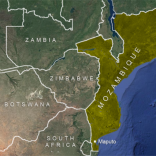Mozambique: ‘Já Chega’ initiative launches in Nampula province as over 24,000 acute ...
Mozambique: New minimum wages in times of crisis

DW
The readjustment of the minimum wage approved by the government on Tuesday is valid as of the start of April for all the productive sectors of the country. Trade unions say the increase fails to meet worker’s needs.
In Mozambique, trade unions consider that the new minimum wages approved by the government fall far short of workers’ needs, although they acknowledge that it is acceptable, given the current economic and financial environment of the country. The increases vary between 5 and 18.67 percent, the lowest figures applying to some state sectors and the highest to the mining industry and large companies.
State employees and agents will get a 6.5 percent increase in the minimum wage, to 4,255 meticais, equivalent to just over 57 Euros. The government also decided to provide 1.8 billion meticais (24 million Euros) for the resumption of administrative acts such as progression in professional careers, promotions and changes of categories.

The announcement was made by Minister of State Administration and Civil Service Carmelita Namashulua. “The whole preparatory process is proceeding so that, from May, we can again start the administrative acts that were interrupted in 2015,” she said.
“Insufficient”
The Organization of Mozambican Workers Trade Union says the current salary readjustment falls short of workers’ needs. According to the organisation’s head of Labour Relations, Daniel Ngoque, “the results achieved have not met the primary needs of a Mozambican worker”. “We are still far from reaching this level,” he adds.
Members of the public interviewed by DW Africa on the streets of Maputo agree that the new salaries do not reflect the current cost of living. Jochua Armando Inguane says the increase is not enough, “because things in the market are very expensive and this money does not even pay to pay the ‘Chapa’ (minibus fare)”.

António Jacinto, who works in the security sector, also highlights the increase in the cost of living and states that “there was not any real increase [of salaries].” Rodrigues Mendes, who works in the tertiary sector, says that “the increase that the government has agreed doesn’t benefit us, because everything has gone up, and we work in a weaker sector”.
Negotiations
The negotiations that culminated in the fixing of the current minimum wages were not easy, according to Jeremias Timane, Secretary General of the Confederation of Free and Independent Trade Unions.
Although he also agrees that the wage increase is far below the needs of the workers, Timane recognises that it is acceptable, in view of the economic and financial environment in the country.
He argues, however, that negotiations should continue at the company level. “Our union committees at the micro level have had extremely positive discussions, very different from these sector-level results,” he concludes.
Watch: New minimum wage for public administration announced – AIM report
Trade unions warn of increasing poverty













Leave a Reply
Be the First to Comment!
You must be logged in to post a comment.
You must be logged in to post a comment.